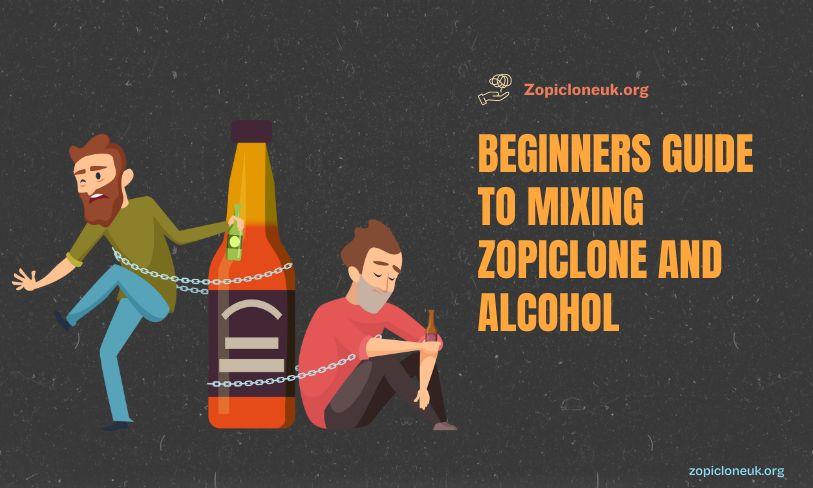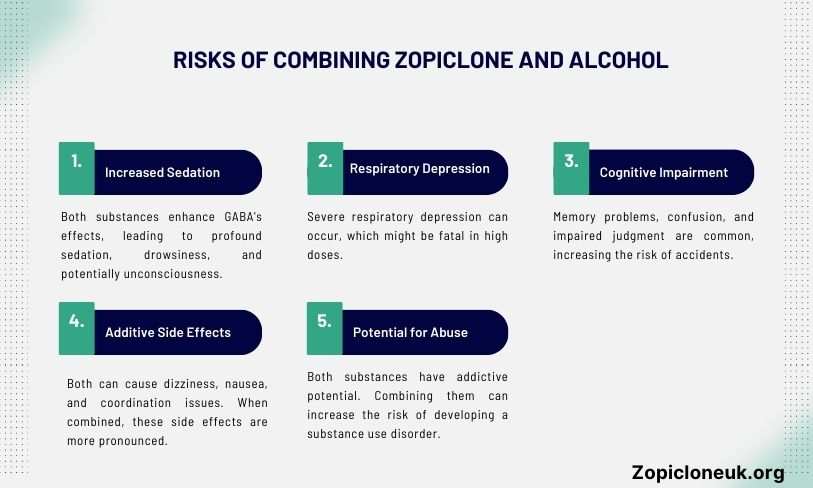
Beginners Guide to Mixing Zopiclone and Alcohol:- Combining medications and alcohol is often risky, and this holds for Zopiclone, a commonly prescribed medication for insomnia. This guide aims to provide a comprehensive understanding of the interactions between Zopiclone and alcohol, their potential risks, and how to manage their use safely.
Contents
What is Zopiclone?
Zopiclone, sold under brand names like Imovane and Zimovane, is a non-benzodiazepine hypnotic agent used primarily for the short-term treatment of insomnia. It works by modulating benzodiazepine receptors to enhance the inhibitory neurotransmitter gamma-aminobutyric acid (GABA), leading to sedation and improved sleep quality.
How Zopiclone Works
Zopiclone’s mechanism involves interacting with GABA receptors, similar to benzodiazepines but with a distinct molecular structure. This interaction increases GABA’s effects, promoting relaxation and sleep. Zopiclone is effective for helping users fall asleep faster and maintaining sleep throughout the night.
Effects of Alcohol
Alcohol is a central nervous system depressant that affects GABA receptors similarly to Zopiclone. It can enhance the sedative effects of Zopiclone, potentially leading to dangerous levels of sedation and respiratory depression. Alcohol consumption alone can impair cognitive and motor functions, and when combined with Zopiclone, these effects can be magnified.
Risks of Combining Zopiclone and Alcohol

- Increased Sedation: Both substances enhance GABA’s effects, leading to profound sedation, drowsiness, and potentially unconsciousness.
- Respiratory Depression: Severe respiratory depression can occur, which might be fatal in high doses.
- Cognitive Impairment: Memory problems, confusion, and impaired judgment are common, increasing the risk of accidents.
- Additive Side Effects: Both can cause dizziness, nausea, and coordination issues. When combined, these side effects are more pronounced.
- Potential for Abuse: Both substances have addictive potential. Combining them can increase the risk of developing a substance use disorder.
Real-life Implications and Case Studies
Numerous cases highlight the dangers of mixing Zopiclone with alcohol. Users often underestimate the cumulative effects, leading to emergency room visits for overdose, severe accidents, or even fatalities. For instance, studies and reports have documented instances of severe respiratory depression and fatal overdoses due to this combination.
Managing Zopiclone Use
- Strict Adherence to Prescription: Follow the prescribed dosage and avoid using Zopiclone beyond the recommended duration.
- Avoiding Alcohol: Refrain from consuming alcohol while taking Zopiclone.
- Monitoring for Side Effects: Be vigilant about any adverse effects and report them to a healthcare provider.
- Educating Yourself: Understand the risks and interactions of combining different substances.
Alternatives to Combining Zopiclone and Alcohol
- Lifestyle Changes: Improving sleep hygiene, such as maintaining a regular sleep schedule and creating a restful environment.
- Therapy: Cognitive-behavioral therapy for insomnia (CBT-I) can be effective.
- Non-Pharmacological Aids: Herbal supplements like valerian root or melatonin might offer benefits without the risks associated with Zopiclone and alcohol.
Conclusion
Mixing Zopiclone and alcohol poses significant health risks, including severe sedation, respiratory depression, and cognitive impairment. It is crucial to avoid combining these substances and adhere to prescribed treatments. Exploring alternative approaches to manage insomnia can help mitigate the need for medication and promote safer, healthier sleep habits. Always consult with a healthcare provider before making any changes to your medication regimen, and prioritize your safety above all.
Author Details




Medical content by qualified psychiatrists
Our editorial policy

Modafinil precautions Read our potential abuse notice

Looking for a seller? Locate the best Zopiclone vendor






